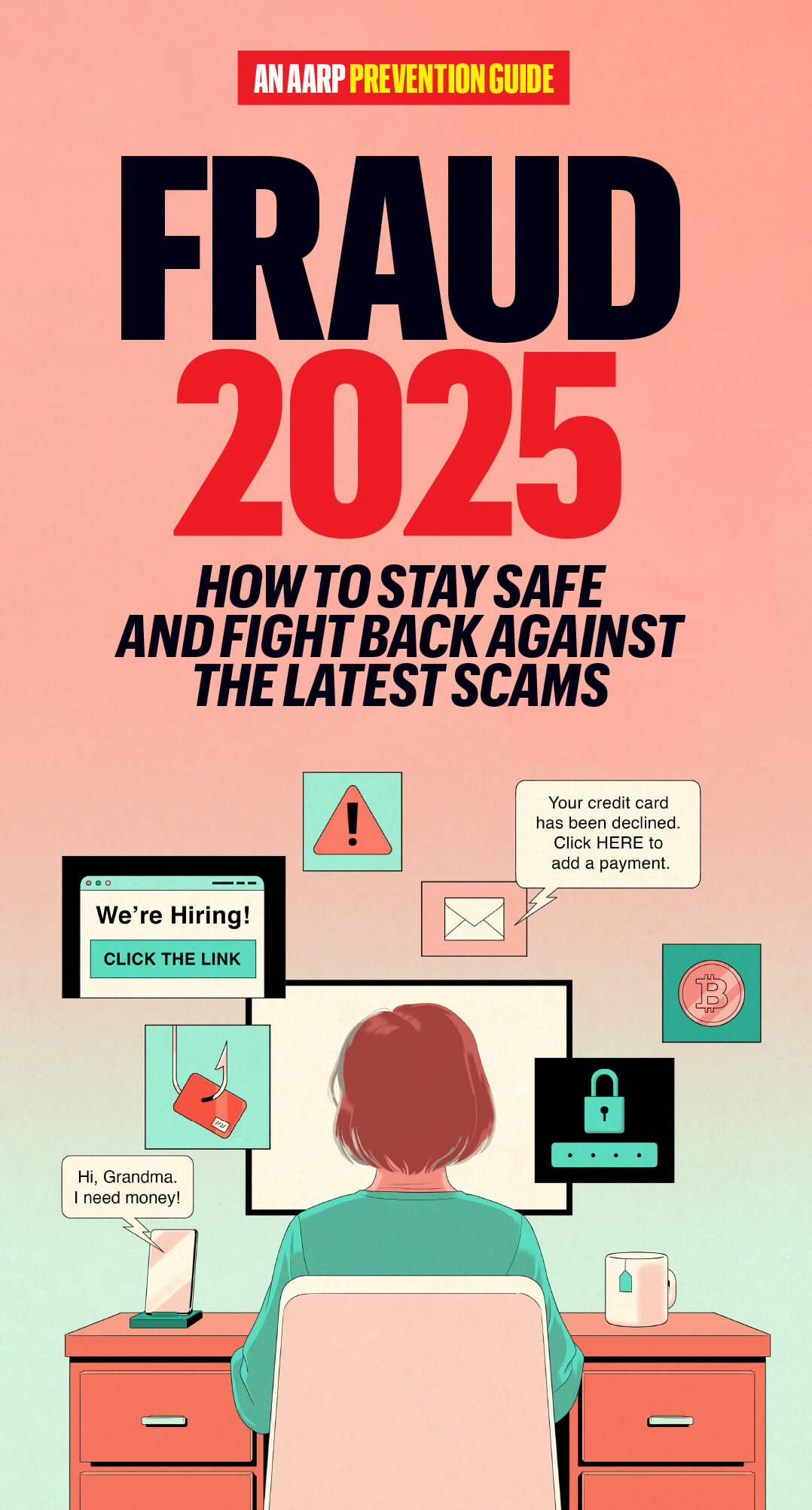
ILLUSTRATIONS BY ANUJ SHRESTHA
When Rory Macleod stepped in to help his mother during a health crisis, he learned that at least $800,000 had been stolen from her in a series of romance scams. The crime took a terrible toll on his family—and they are not alone. In a 2023 Gallup poll, 15 percent of Americans said a household member had been tricked into giving money or financial information to a scammer.
AARP has been on the front line helping older Americans fight back against fraud. In this edition of the Bulletin, we alert you to the hot scams being used right now, bring you up to speed on artificial intelligence (AI) as a weapon of crooks, introduce you to the cost of fraud on families, and give a glimpse into the psychology of scams. And we reveal the top tips of some of America’s best fraud fighters. Finally, we highlight a new initiative AARP is cosponsoring aimed at stopping elder fraud and plug you in to all of AARP’s fraud prevention resources. It can be scary out there. But here’s the latest intel from the fraud battlefield to educate you and keep you safer. —The Editors
HOW THEY TRY TO TRICK YOU NOW!
Artificial intelligence has supercharged classic cons
BY KEN BUDD
Hi Dr. Richard,” the text to Amy Nofziger began. “I was playing with my puppy today and noticed a lump under his nipple.” The stranger requested an exam and included a photo of her puppy’s belly.
Nofziger isn’t a veterinarian. In fact, she’s the AARP Fraud Watch Network’s director of victim support. So she recognized a scam tactic in this innocent-seeming email. But even she was impressed by the sophisticated effort of the crook to engage her—including a cute puppy photo. “If I wasn’t aware that they’re using emotional manipulation, I would have said, ‘Sorry, you have the wrong number. I hope your puppy is OK,’ ” says Nofziger.
Enhancing a standard scheme to hook someone into an online conversation illustrates the hottest scam trend for 2025: using technology such as artificial intelligence to make old scams new again.
“A lot of the scams that were tried and true in 2024 are going to be repurposed, especially with the advent of more effective AI,” says Michael Bruemmer, vice president of consumer protection at Experian.
Here are five new-and-improved scams to watch for in 2025.

TECH CHATBOTS
The fraud often starts with a pop-up message saying your computer has a virus. After clicking a link or calling a fake support number, you give a criminal remote access to your computer—and all of your information. Scammers may also install malware or sell you useless software, maintenance or warranty programs.
NEW WRINKLE: Foreign scammers with limited English can use AI to create more convincing emails and texts. AI also allows criminals to gather info about you from social media and other sources to craft targeted messages, says Steve Weisman, founder of Scamicide.com. And AI allows crooks to analyze data—such as the names of people who recently searched for tech support—to find potential victims, Weisman says.
PROTECT YOURSELF: Legit tech companies won’t contact you about problems with your computer, and their pop-ups will never ask you to make a call or click a link. If a tech-support person calls, it’s likely a scam. Never click on a pop-up, share a password or give remote access to an unexpected caller.

CARD-DECLINED NOTIFICATIONS
Consumers try using a credit card while making an online purchase, but the card gets rejected. They then try a different card, but that one fails too. The charges, however, have occurred for each transaction, despite the card-declined notices, and often for more money than they thought.
NEW WRINKLE: Scammers are mimicking popular companies and products. In September 2024, the American Automobile Association warned members about emails and texts that appeared to come from AAA customer service, offering a free car emergency kit if people took a survey. The catch: You had to pay for shipping, which led to the card-declined message. One victim found several fraudulent charges on his two credit cards. “We’ve seen a noticeable increase in card-declined problems,” says Melanie McGovern, director of public relations for the International Association of Better Business Bureaus Inc.
PROTECT YOURSELF: Use a credit card—they offer stronger fraud protections than debit cards. Scammers often build lookalike sites, so scrutinize the URL (a letter or two might be different). And ignore unsolicited offers. “Don’t click on any links or answer any calls,” Bruemmer says.

CRYPTO CRIMINALS
Scammers use dating and messaging apps, social media and wrong-number texts to slowly build relationships with targets, then share their “expertise” on investments. Once you start investing, you may receive fake profit reports, which encourage you to invest more. But when you try to withdraw funds, you’re charged outrageous fees—and these bogus companies often vanish. The ruse grew during the pandemic, fueled by scam centers in Southeast Asia.
NEW WRINKLE: Cryptocurrency is hot. The price of one Bitcoin reached $100,000 for the first time in December 2024, and it could hit $200,000 or more in 2025, many financial professionals predict. The hype could lure you into fraudulent investments. Plus, scam centers have expanded to new countries, from the Philippines to the United Arab Emirates.
PROTECT YOURSELF: Don’t answer wrong-number calls or texts. If you’re interested in crypto but lack expertise, talk with a financial adviser or someone at your bank.

CELEBRITY IMPOSTORS
Impersonation scams aren’t new. A classic fraud involves an impostor claiming to be a desperate relative and begging a parent or grandparent to wire money. But celebrity impostors are particularly prominent: The AARP Fraud Watch Network Helpline receives dozens of reports of these scams each month.
NEW WRINKLE: AI is leading to realistic-yet-phony product endorsements, such as fake video of Kelly Clarkson promoting weight-loss gummies. “Deepfakes, both audio and video, have gotten so good, it’s hard to tell [what’s real],” Bruemmer says. Nofziger is most concerned about scams in which people believe they’ve entered a relationship with a celebrity. “These are the ones we see the most,” she says. And yes, the supposed celebrity always needs money.
PROTECT YOURSELF: Real celebrities will never ask for money. Before buying a product based on a celebrity recommendation, search the person and product online, with words like “scam” or “fake.”

FAKE JOBS
Criminals gain your personal information through ploys such as phony job ads or fake recruitment emails. You’re told you got the job, so you fill out paperwork that includes your Social Security number and bank account information.
NEW WRINKLE: “[Criminals] assume the identities of real companies and often the names of the real HR manager or hiring manager,” says Eva Velasquez, CEO of the Identity Theft Resource Center. Some will even conduct fake interviews and pay a bonus (with a check that will bounce) once you’re “hired,” then ask for money back due to “overpayment,” the Federal Trade Commission reports. Others ask you to pay for training or useless certifications, or to cover shipment costs for equipment.
PROTECT YOURSELF: Platforms such as LinkedIn and Indeed do their best to police fake ads, “but they don’t catch everything,” Velasquez says. If you’re contacted by a recruiter, visit the company’s website. See if the job opening is real and if the person actually works there. And verify the process for submitting an application.
Ken Budd writes frequently for AARP, and his work has appeared in The Atlantic, The Washington Post, National Geographic Traveler and many more.
ICONS BY ELIAS STEIN